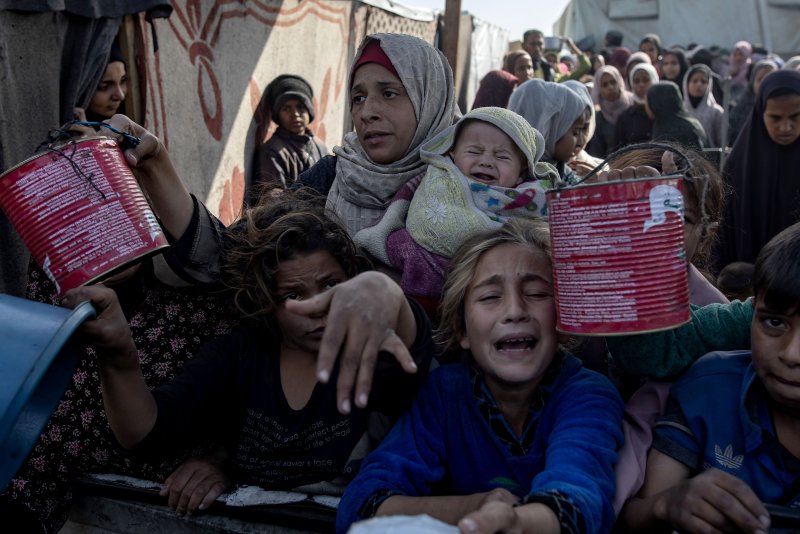Palestinians, including children, hold metal pots and pans as they gather to receive food cooked by a charity kitchen, in Khan Yunis, southern Gaza Strip, on January 10, 2025. According to the UN Palestinian refugee agency UNRWA, over 1.8 million people across the Gaza Strip are experiencing ‘high levels’ of acute food insecurity. Photo by Haitham Imad/EPA-EFE
Jan. 12 (UPI) — Last week, the United Nations Office for the Coordination of Humanitarian Affairs quietly warned that telecommunications services like phone and internet access could go dark in Gaza, which human rights workers say could have catastrophic effects for Palestinians.
“OCHA is deeply concerned about the impact that dwindling fuel supplies are having on essential services in Gaza,” the U.N. agency said in a brief statement on the matter. “Palestinian telecommunication providers are now warning that their services may start to shut down tomorrow due to fuel shortages.”
Human rights groups like the Gisha Legal Center for the Freedom of Movement, an Israeli nonprofit, have called Israel’s targeting of civilian infrastructure like telecommunications systems a “grave breach of international law” since soon after the hostilities began.
“It was quite clear that these disruptions resulted from deliberate actions perpetrated by Israeli authorities, and it happened twice afterwards,” Abdulmajeed Melhem, the chief executive of the Paltel Group, the largest telecommunications company in Palestine, said in November 2023 after disruptions to services began.
“All international fiber cables that connect Gaza to the West Bank and the world go through Israeli Territories and, as a matter of fact, the Israeli Authorities can bring down connections whenever they want. They did just that despite all political, legal, and commercial agreements that are signed between all concerned parties.”
In a March 2024 report, Gisha said that telecommunications networks in Gaza have been repeatedly disrupted or shut down completely, affecting emergency services and the delivery of humanitarian assistance.
“Like countless aspects of Palestinians’ day-to-day lives under occupation, telecommunication systems in Gaza and the West Bank are subject to Israel’s control, including the internet, landlines and cellular networks,” Gisha reported.
“Palestinians’ connection to the World Wide Web runs through Israeli infrastructure. Israel also controls the electromagnetic space in Gaza, Israel, and the West Bank and blocks the allocation of advanced frequencies, which impact the functioning of cellular technology.”
Gisha noted that, while Israel now has 5G wireless internet and Gaza has been upgraded to 3G wireless internet, Gaza is still operating with far slower 2G internet. In fact, after the latest hostilities between Israel and Gaza began, Israel reportedly planned to intentionally block all communications in Gaza but ultimately decided not to do so.
“Now, when I want to call, I dial each family member one by one, calling them four or five times to see who connects,” Rana, a 46-year-old woman in the West Bank told NPR last March. “Just tell me you’re fine, and that’s it. I don’t need more.”
By June, the United Nations activated an emergency telecommunications cluster for Palestine, which included examining the viability of providing satellite-based solutions to Gaza purchased from the Israeli firm Gilat Telecom.
“The reduced internet services capacity and recurrent connectivity disruptions across Gaza continues to severely affect life-saving humanitarian aid access, especially in Deir Al Balah where most of the humanitarian responders are now based,” U.N. officials said at the time. “The local ISP faces multiple challenges, including reduced staff, lack of spare parts and safe access to repair and maintain the remaining network services.”
Netblocks, a company that tracks cybersecurity and digital governance globally, noted in September that overall service in Gaza also remains “significantly below pre-war levels.” And Israel intentionally cut internet in northern Gaza in October.
The Palestinian human rights organization 7amleh said later that month that 75% of telecommunications infrastructure had been affected with at least 50% of it fully destroyed. Its report found that the recovery and reconstruction of telecom services in Palestinian territories may only resume if a ceasefire is reached.
Meanwhile, Facebook’s parent company Meta is facing increased scrutiny over alleged censorship of Palestinians.
